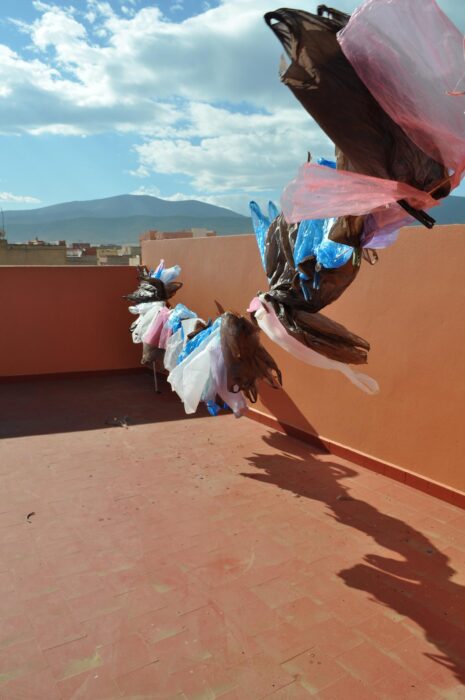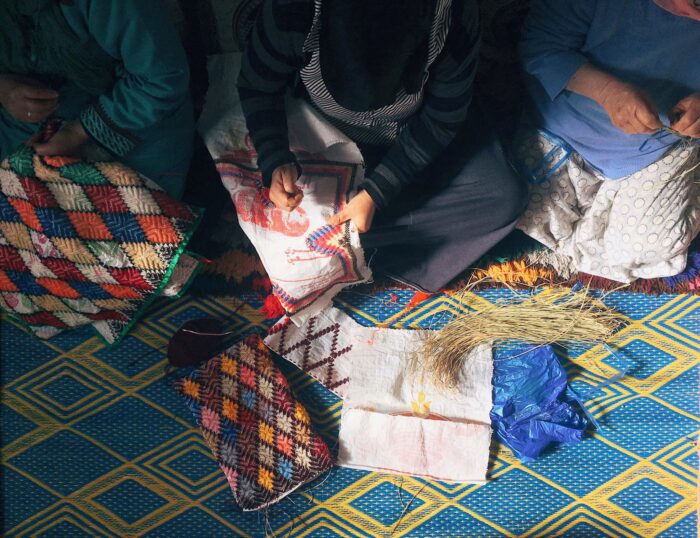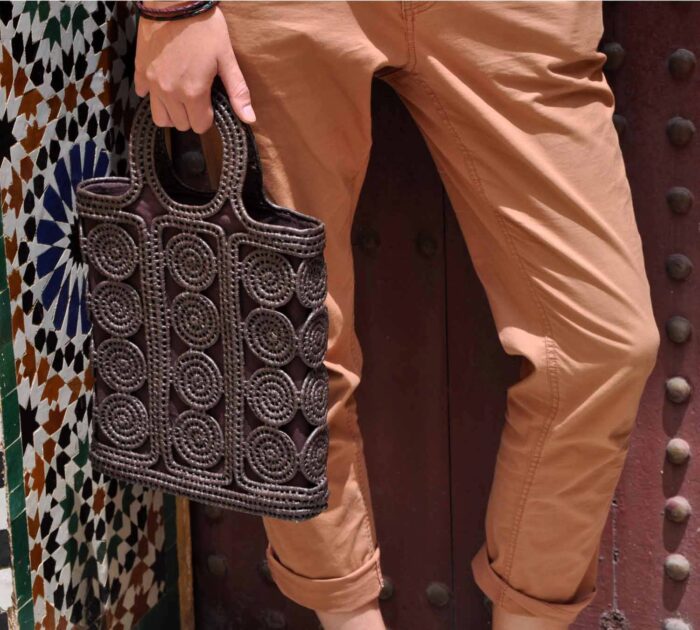More than sixty rural women, skilled in traditional crafts, now work alongside Faiza Hajji, who has done everything to achieve her dream: fighting pollution and creating jobs in Berkane, her hometown, which has been particularly affected by unemployment. In the first quarter of 2024, the Oriental region recorded “the highest unemployment rates” nationally, at 21.4%, according to a note from the High Commission for Planning (HCP).
Faiza Hajji is a social entrepreneur, but also a telecommunications engineer and naturopath. A “perpetual student,” as she describes herself, she is passionate about the human microbiome and the concept of “One Health” (a global approach to health issues). She has successfully combined her beliefs into holistic projects that serve her community.
TelQuel: How did you manage to create Ifassen and the Association du Docteur Fatiha (ADF)?

The idea for Ifassen (a social, ecological, and solidarity-driven business created in 2006) and the Association du Docteur Fatiha dates back to my adolescence. I loved cycling, and one day, I found myself in an area on the outskirts of the city, “Douar el Mika,” which, unfortunately, lived up to its name. It was covered in black plastic bags, as far as the eye could see. At first, I was shocked by all these plastic bags being carried away by the wind. Then, I started thinking of solutions to transform this waste and fight against plastic pollution.
The solution came to me a few years later, thanks to one of my mother’s patients. My mother, Dr. Fatiha, was a doctor in Berkane and often treated women from the surrounding villages. One day, this patient gave her a basket of bread. It was woven, but in addition to the plant fiber, alfa, she had incorporated biscuit wrappers with the shiny side on the outside. I immediately thought back to the plastic bags and realized it would be interesting to reproduce this weaving technique but using plastic bags.
At that time, I was studying at an engineering school in France, and there was a student entrepreneurship contest. I participated with this idea of collecting plastic bags to give them a second life through this weaving technique, while also creating an income-generating activity for rural women. I won first prize, which allowed me to embark on this wonderful human adventure!
How do your two projects work? And what are their impacts on the socio-economic development of women on one hand, and raising awareness about plastic pollution on the other?
The projects developed by ADF combine environmental protection with socio-economic development in rural areas. These initiatives create an inclusive circular economy, reducing plastic waste while improving the living conditions of rural women.
The approach is holistic and includes three components: circular economy, training, and environmental education. Various products marketed under the Ifassen brand have been eco-designed in collaboration with international designers, architects, as well as museums (such as the Quai Branly Museum in Paris) and design schools (IED Madrid). These activities generate income for the women, making them economically independent while also enhancing their professional skills.

At the same time, fun programs in schools have raised awareness among more than 3,000 children about the dangers of plastic pollution, contributing to environmental consciousness from an early age.
Ten years after the launch of Ifassen (2006), Morocco banned the production and use of plastic bags in 2016. What are the results of this measure in 2024?

The plastic bag ban was a major turning point for Morocco in terms of environmental protection. It aimed to reduce plastic pollution, improve waste management, and protect ecosystems. The ban has had some visible positive effects on the environment and society, but sustained efforts are still needed to overcome persistent challenges and maximize its long-term benefits.
“The black market for plastic bags persists, and the proposed alternatives present new challenges”
The black market for plastic bags persists, and the proposed alternatives present new challenges, particularly in terms of sustainable production and waste management associated with these materials. This limits the overall impact of the measure. Despite the progress made, on-the-ground support for the implementation of sustainable alternatives and long-term awareness efforts remain essential to maintain ecological habits and address new environmental challenges.
Through your projects and partnerships, you address persistent problems in Morocco, such as the situation of precarious, illiterate rural women, and climate change.
Many inequalities persist in our country, and the precarious situation of rural women is one example, a situation worsened by climate change, which presents new challenges… but also opportunities to act and innovate! It is in this sense that ADF’s project continues to evolve to best address these new challenges.
You are increasingly interested in the food transition, health, and climate change. Can you tell us about the new goals of your NGO?
Indeed, the new goals of the Association Docteur Fatiha now focus on three main areas. First, raising awareness about healthy and sustainable eating, based on scientific evidence (particularly microbiome science), to promote dietary habits that benefit both human health and the environment. Second, promoting triple-impact entrepreneurship by supporting projects that provide economic benefits while also having positive environmental and social impacts. And third, fostering a culture of peace by integrating these practices within a broader framework of sustainable development and social cohesion.
The new objectives of our NGO were inspired by my master’s thesis titled « One Health and Microbiome: Could the Food System Be the Key to Healthy People on a Sustainable Planet? » These directions aim to combine the principles of global health (One Health) with practical solutions for a sustainable future.
Morocco is experiencing a clear crisis with its water resources, which, combined with low rainfall, demands the adoption of sustainable solutions. How can we encourage creative and innovative social entrepreneurship to address these climate challenges?
Morocco is not immune to the effects of climate change, which impacts various ecosystems around the planet. Water stress in Morocco is a complex issue that requires an integrated approach, combining investments, effective management, and behavioral changes to ensure the sustainable availability of water resources.
The intensive food system has significant negative impacts on biodiversity and water resources, reducing ecosystem diversity and placing excessive pressure on water supplies. Adopting more sustainable agricultural practices is crucial to mitigating these effects and preserving natural resources and biodiversity.
Additionally, soil microbiota plays a key role in managing water resources by improving soil structure, increasing its water retention capacity, and optimizing the use of water resources by plants. Integrating this understanding into agricultural practices can help better manage water resources and promote sustainable agriculture based on new scientific discoveries combined with modern and ancestral best practices.
Certainly, Morocco faces significant challenges related to water availability and quality. However, these issues also present opportunities for entrepreneurship and creative solutions. To maximize these opportunities, it is crucial to promote civic entrepreneurship by facilitating access to financing, training, and on-the-ground support for projects.
Faiza Hajji has won several international awards recognizing women contributing to sustainable development. In 2009, she was awarded the Photography Prize, organized by the United Nations Development Programme (UNDP), for her photo report showcasing the process of transforming plastic bags into handbags and fashion accessories.
Five years later, she won the Terre de Femmes award from the Yves Rocher Foundation, which annually honors eco-creative women. Creativity? Faiza has no shortage of it. That’s why, in 2006, she was listed among the 100 most inspiring women in the world by Salt Magazine.
The woman who aims to “make environmental protection a driver of the local economy” also became the first Moroccan to join the Chilean incubator Start-Up Chile in 2013. Launched in 2010, this program brings together a hundred women with innovative projects, providing them with the necessary resources to develop their ideas.
Written in French by Karim El Haddady, edited in English by Eric Nielson



